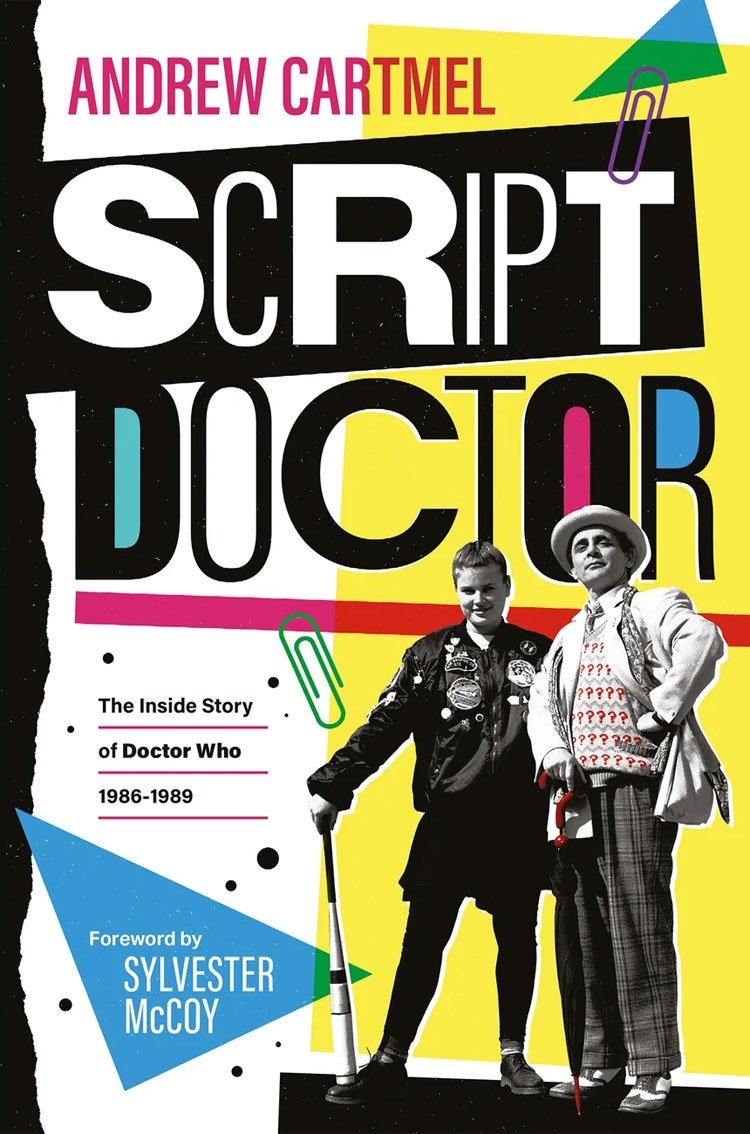Andrew Cartmel’s Script Doctor, originally published in 2005 then reprinted a few years (but since gone out of print again), has just been reissued by Ten Acre Films in a handsome new edition, packed with excellent behind-the-scenes photographs. While he was putting in endless hours on the show, Cartmel found the time to keep a diary, often scribbling his impressions, observations, and thoughts down in real time, on the back of a script as rehearsals unspooled around him. It’s this method of writing which gives the book such authenticity and vividness.
I enjoyed Script Doctor very much and rate it highly as an excellent diary in its own right, not just as a book about Doctor Who. Don Draper has a line in Mad Men about the nature of nostalgia: it’s not just about memory, the word nostalgia actually means a pain in the heart at recalling the past. I found Script Doctor very poignant as an evocation of the late 1980s: when the summers seemed to be hotter than any other summers and the winters colder than any other winters; when the Tories seemed destined to rule for ever and Sylvester McCoy, as Cartmel writes, sighed with disappointment as Mrs Thatcher won for the third time in 1987. Back in the Eighties, scripts did not ping into inboxes: they were ferried by taxi across London, back and forth between the script editor and his writers. Back in the Eighties, Cartmel mentored Ben Aaronovitch to take over from him as script editor even as he was uncertain, year after year, that there would even be a next season…
For me, Andrew Cartmel’s book evoked a time when I was young. I was in my early 20s in 1986 and just embarking on a teaching career, still watching the new episodes of Sylvester McCoy’s Doctor Who and often being terribly disappointed by what I saw. But Cartmel’s book has given me a completely different perspective on a period of the programme which I actually didn’t like very much.
When Andrew arrived at the BBC, he was dismayed to find that Time and the Rani, which he thought was rubbish, was the first script he had to deal with. John Nathan-Turner had been keen to use Pip and Jane Baker again, but Cartmel found them to be old-style writers, set in their ways and closed-minded to suggestions from a whipper-snapper script editor like himself. Nathan-Turner, when he saw the finished shows, eventually agreed with Cartmel, and said of Pip and Jane, “I don’t think we’ll be using them again.” Cartmel recalls his BBC interview with Jonathan Powell, who asked him, “Who do you think Doctor Who is for?” Cartmel tried to explain he thought it was for everybody, for adults, but Powell shook his head as soon as he started to answer. “Doctor Who is for children,” said Powell softly. Cartmel saw the show as a serious science fiction programme for adults, and that’s what he attempted to create, but he found himself tearing his hair out in frustration at a BBC that didn’t value the show and, as he writes tellingly, didn’t understand it. The scripts for Battlefield specified that the knights wore android, cyborg-like armour: the designers presented the director with medieval armour. Cartmel wanted a specially designed prop as the time controller in Remembrance of the Daleks: the props people bought a child’s off-the-shelf sparking toy instead.

I was especially struck by how much the production team, and especially John Nathan-Turner, felt themselves at the time to be under siege – not so much by the BBC as by the fans. DWB (Doctor Who Bulletin) – which I read (who remembers it out there, fellow readers?) – was ferocious and personal in its criticism of Nathan-Turner, even creating a petition calling on him to go. Nathan-Turner read DWB and was hurt and wounded by it; the petition story (“JNT must go!”) got into the national press and then he was wounded some more. Crazy fans forged letters giving them permission to visit the studio to watch filming, and studio security had to be briefed not to let them in. I remember, in the 1980s, that Cartmel was seen by fans as elusive and a bit of a puzzle; Script Doctor indicates that he deliberately decided not to give interviews because he know how hostile – and downright unpleasant and destructive – the fan press could be.
As I’ve said, this wasn’t a period of the show I much liked but I am struck by how much Cartmel invested in it, wanting it to be the best that it could be and spending hours and hours with new writers, trying to hone their scripts into great stories. It is notable that the writers were mostly young people (and mostly men) who had just completed the BBC writers’ course: Doctor Who was often one of their first assignments. Cartmel rated them all highly and praised the quality of the storytelling. I’m not so sure: not everyone can write for Doctor Who, and Seventies producers Hinchcliffe and Williams both said that they tried and tried to find and sign up new writers, but new writers often just didn’t “get” the series: result – the endless recommissioning of Terry Nation and Terrance Dicks.
Cartmel wanted to restore the mystery of the Doctor: he wanted the Doctor to be like the dangerous, unpredictable alien we had met in William Hartnell way back in 1963, and the way to do this was to change the backstory completely (sound familiar?). The Doctor was not simply a Time Lord, that was too boring and simple: he was much more complex and alien – and much, much older – than that. (Sound familiar again?) Nathan-Turner, who wasn’t very interested in Cartmel’s ideas, let him go ahead anyway.
Reading Script Doctor, I realised how easy it is for fans to make quick criticisms of the programme and to dismiss something that has been made with love and care. However much one is tempted to think so, no one sets out to make a bad episode of Doctor Who. I was struck that the production office in the 1980s actually read the fan press and were often upset by it: does the present production team read the websites? Does Chris Chibnall read the DWC? It is, I think, justified for us to make thoughtful criticisms of the programme, as it is of any art. It isn’t good critical practice to pretend that something is wonderful when it isn’t. However, we shouldn’t frame our comments personally and certainly should not write things with the intention of hurting people who care about Doctor Who as much as we do, even if what they produce isn’t to our taste or doesn’t accord with our understanding of what Doctor Who is or ought to be. There are so many parallels between the McCoy/Cartmel era of the programme and the present regime of Chris Chibnall: a new Doctor, a new backstory, the eschewing of old writers in favour of brand new ones, an attempt to retool the show completely, and a very negative reaction (sometimes justifiably so?) from some fans (like me).
I love diaries and I love reading them. I think Script Doctor is as good a piece of diary genre literature as the diaries of Alan Clark, Chris Mullen, Kenneth Williams, or Richard Burton. It brings to life another era and Andrew Cartmel writes beautifully. It is thoughtful, funny, vivid, illuminating, revelatory, and sometimes melancholy. Buy it. Read it. Enjoy it. Relive the Eighties and feel young again.
Script Doctor is currently sold out, but keep visiting Ten Acre Films because enough coverage might mean it’s reprinted soon.



